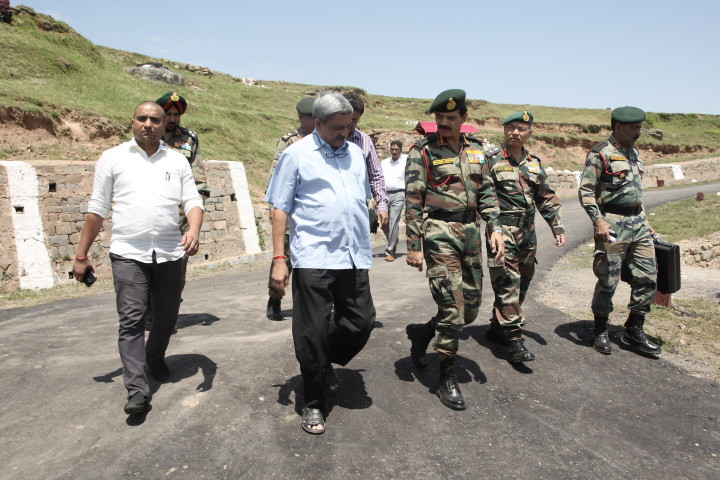Jammu, Poonch and Rajouri: India’s Defence Minister Shri Manohar Parrikar completed a two day visit to Jammu & Kashmir on 23 May 15. He was in the state to review the overall security situation.
On the second and last day of his visit the defence minister arrived at Jammu airfield accompanied by Chief of Army Staff, General Dalbir Singh and Army Commander, Northern Command, Lieutenant General DS Hooda.
The defence minister was received at Jammu Airport by General Officer Commanding, White Knight Corps, Lieutenant General KH Singh and went on to visit the forward areas by the line of Control (on LoC) in Hamirpur Battalion Area where he was received by General Officer Commanding, Ace of Spades division.
At that place he was briefed on the current security situation along the LoC and areas south of Pir Panjal by the General Officer Commanding, White Knight Corps. The briefing included the overall security situation, cross-border infiltration, measures on security grid for LoC, counter terrorist operations and the counter IED measures in place. He was also shown surveillance equipment being used as part of the surveillance grid.
Also, the defence minister was briefed on the various Sadbhavna projects and initiatives that are being undertaken by White Knight Corps. The Chief of Army Staff and Army Commander, Northern Command emphasized the villages that are beyond the fence are devoid of basic amenities in term of schooling and health care, it is the local Army units who are providing the necessary assistance in terms of education, community centres, solar lights, and holding regular medical camps as part of Sadhbavna initiatives.
Children from these border villages are also taken for various National Integration Tours on a regular basis. The defence minister interacted with the troops over a cup of tea to get first hand input of the ground situation. Apparently, he appreciated the high standards of military discipline and preparedness of the troops and their excellent performance in the difficult terrain and challenging operational environment.
Also see more photos at: http://www.pressenza.com/2015/05/indias-defence-minister-tours-the-line-of-control-in-jammu/
Editors note:
The conflict in and around the disputed regions of Jammu and Kashmir has its roots in independence in 1947, when British India was divided between India and Pakistan. Outbreaks of war occurred between the two countries in 1947, 1965 and 1971. A militant insurgency, which displayed increased levels of violence from 1989, has led to tens of thousands of deaths.
In the context of ongoing insecurity in Afghanistan, and with both India and Pakistan possessing nuclear weapons, the persistence of instability in Kashmir poses a real threat to regional security in South Asia.
Conciliation Resources supports civil society to play a more dynamic and proactive role in peacebuilding in the region. Our goal is to enhance the prospects for a non-violent and just transformation of the conflict over the disputed territories of Kashmir.
There are few avenues for the diverse population of Kashmir to be included in peacebulding processes. We believe that greater participation by the people of Kashmir will create a more productive India-Pakistan peace process to resolve the Kashmir conflict, recognising that in order to achieve any sustainable settlement it must be acceptable to all sides.
Enhancing peacebuilding capacity
Conciliation Resources promotes ownership of and participation by Kashmiris in the India–Pakistan peace process. We work in all of the regions of the disputed area including Pakistan-administered Jammu and Kashmir and Gilgit-Baltistan, and in Indian-administered Jammu and Kashmir. We also work with the diasporas.
Our aim is to develop the peacebuilding capacities of people on both sides of the Line of Control (LoC) and contribute to informal peacebuilding processes, by facilitating shared analysis, dialogue and practical engagement at regional and cross-LoC levels.
We work to:
- Strengthen confidence across the LoC particularly in the realms of trade and higher education
- Increase the peacebuilding skills and influence of a number of NGOs
- Increase the engagement of women and youth in peacebuilding
The difference we make
Using our experience of peacebulding from other conflict contexts, and our knowledge of the conflict over Kashmir, we are able to work with partners to strengthen their organisational capacities. Critically we have been able to play a bridging role in facilitating connections across the LoC that otherwise are difficult to initiate and sustain.
Over the past two years we have brought members of civil society from across the LoC together on a number of occasions and in addition over 400 people have taken part in conflict transformation workshops within their own societies. Through building relationships, facilitating workshops and supporting research, we are also able to investigate previously under-explored areas that hold potential for peacebuilding such as cross-LoC trade and education.
The senior-most Cabinet Minister in Jammu and Kashmir government, Abdul Rahim Rather, has lauded the efforts of Conciliation Resources in bringing out a publication on Cross-Line of Control Trade, which is a key confidence building measure in the state… [He] found the collection of highly researched discussion papers useful and said that publication would help the policymakers in understanding various view points from both sides of the Line of Control.
State Observer, March 2011
– See more at: http://www.c-r.org/our-work/kashmir?gclid=CM-q0Mz428UCFQ0AvAodQ3gAUA#sthash.8q7Hc0Nx.dpuf










